-
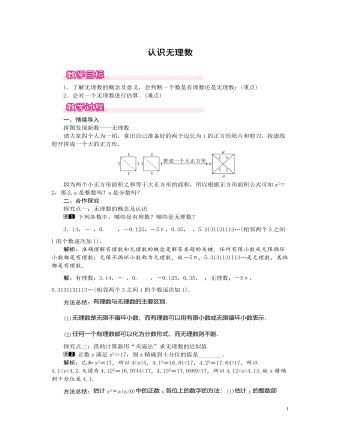
北师大初中数学八年级上册认识无理数1教案
解:有理数:3.14,-53,0.58··,-0.125,0.35,227;无理数:-5π,5.3131131113…(相邻两个3之间1的个数逐次加1).方法总结:有理数与无理数的主要区别.(1)无理数是无限不循环小数,而有理数可以用有限小数或无限循环小数表示.(2)任何一个有理数都可以化为分数形式,而无理数则不能.探究点二:借助计算器用“夹逼法”求无理数的近似值正数x满足x2=17,则x精确到十分位的值是________.解析:已知x2=17,所以417,所以4.117,所以4.120)中的正数x各位上的数字的方法:(1)估计x的整数部分,看它在哪两个连续整数之间,较小数即为整数部分;(2)确定x的十分位上的数,同样寻找它在哪两个连续整数之间;(3)按照上述方法可以依次确定x的百分位、千分位、…上的数,从而确定x的值.

新人教版高中英语必修3Unit 5 The Value of Money- Discovering Useful Structure教学设计
Step 3 Meaning1. 过去将来时表示从过去某一时间来看将要发生的动作或存在的状态, 常用在宾语从句中。一般由“would/should +动词原形”构成。She hoped that they would meet again someday. 她希望将来有一天他们能再见面。2. was/were going to+动词原形: 表示过去将要发生或很有可能发生的动作, 常用于口语中, 表示预言、意图或者打算等。He was going to start work the following week. 他打算下星期开始工作。3. was/were about to do: 常用来表示即将发生的动作, “刚要/正要做……”。注意该结构不与任何时间状语连用。I felt that something terrible was about to happen. 我感到某种可怕的事情即将发生。4.was/were to do: 表示“曾计划做某事”, 如果表示“本来计划做某事, 动作没实现”, 则需用 “was/were to have done”。She said she was to have told me about the accident. 她说她本来想告诉我关于事故的事。5.Start, go, come, leave, see, meet等动词的过去进行时: 表示就过去某一时刻而言即将发生的动作。She was coming later. 她随后就来。I had just put on my overcoat and was leaving to visit a friend of mine. 我刚穿上外套要去看我的一个朋友。

新人教版高中英语必修3Unit 5 The Value of Money-Listening &Speaking教学设计
Step 4: Listen again and decide if the following statements are true (T) or false (F).1 It was the first time Chen Liyan's story was reported. T口 F口2 Chen found 10,000 yuan in a small plastic bag in Taiyuan railway station口 F口3 Wang Zheng apologized to Chen because he couldn't offer her more money. T口 F口4 Chen took out a large loan to cure her daughter, T口 F口5 Wang set up a fundraising website for Chen's daughter after Chen told him about her situation. T口 F口Step 5:After listening, discuss the questions.1 What kind of person do you think Chen Liyan is?Chen Liyan is generous and honest because she returned a large sum of money to the owner.2 Did Chen return the money because she didn't need it?No. She returned the money because it was the right thing to do. Evidence for this is that she refused to accept the reward money because she felt that it had not been earned. 3 Is it common for people to do what Chen did?It depends on the culture. In some countries it is quite common to return money that has been found. In other countries, people believe "Finders are keepers!" 4 How did Wang Zheng feel about the return of his money?He must have been very happy and relieved to have gotten his money back. We know this because he thanked Chen repeatedly and even offered her a reward.5 Why did Ma Dongbao tell Wang about Chen's family?He must have had great sympathy for Chen and her daughter and wanted to help them.'We know this because he arranged help for them. 6 How did the news reporter feel about Chen's actions?The news reporter felt that it showed that money wasn't the most important thing in life. We know this because the reporter told us that this is what Chen believes. and then said, “that's a great attitude to take."

新人教版高中英语必修3Unit 5 The Value of Money-Listening &Speaking&Talking教学设计
4. A:We’d like to have someone to say a word at the beginning to welcome the group.B:↙Who?A:We thought that you or Dr.Johnson might do it.B用降调说Who,其意思是问,对方想让谁在开场时致欢迎词。Step 6 Pronunciation---Practice1. Listen to the short conversation and mark the intonation with ↗, ↙ or ↙, ↗. Then discuss with a partner what they intend to convey by using different intonation.Owner: You know what ?↗ It’s a million-pound bank note↙.Waiter 1: Really ?↗(question)Waiter 2: Really !↙(unbelievable and surprised)Waiter 3: Really ?!↙↗(first question then surprised)2. Listen to the conversations. Underline the parts that are stressed and mark the intonation. Then talk about the implied meanings of the responses with different intonations. Listen again and repeat.1) Henry: It’s a nice suit.Owner: Oh, it’s perfect!↙(The intonation means it is very suitable for Henry.)2) Henry: Well, that’s very kind of you.Owner: Kind, sir ?↗(what you said is not right) No, it’s kind of you. You must come whenever you want and have whatever you like. Just having you sit here is a great honour !!↙(welcome you to come again)3)Henry:Well, to be honest, I have none. Oliver:(happily) What luck!(excited) Brother↗, what luck!↙(It means “Didn’t you hear it?”)Henry: Well, it may seem lucky to you but not to me!↗(angry) If this is your idea of some kind of joke, I don’t think it’s very funny. Now if you’ll excuse me, I ought to be on my way.↙(If so, I would leave.)Roderick: Please don’t go↙...(hope Henry can wait for a moment)Part B Viewing and Talking---Describe people’s changing attitudes in a film clipStep 1 Before-listening---Tell the filmYou are going to watch part of the film The Million Pound Bank Note. Look at these photos and guess what happens in the film.

新人教版高中英语必修3Unit 5 The value of money-Reading and Thinking教学设计二
? Could you offer me some kind of work here?? I don’t want your charity, I just want an honest job.? Careless: I landed in Britain by accident.Step 7:Consolidation.? Find Henry? Roderick and Oliver were I .making a bet when they saw Henry, a poor young man. ? Know Henry? About a month ago, Henry was sailing and later he found himself carried out to sea by a strong wind. Fortunately, he 2.was spotted by a ship. And it was the ship that brought him to 3.England? Offer money to Henry ? Oliver and Roderick gave Henry a letter and told him that there was money in it. They 4.persuaded him to accept it, and made him 5.promise that it wouldn't be opened until 2 o'clock.Step 8:Language pointsa large amount of: a large quantity of; a great deal ofe.g. They bought a large amount of furniture before they moved their new house.make a bet: make an arrangement to risk money, etc. on an event of which the result is doubtful.e.g. We made a bet on the result of the match.permit sb to do something: allow somebody to do somethinge.g. My mother doesn’t permit me to ride in the street after it rained.by accident: as a result of chancee.g. I only found it by accident.stare at: look at somebody or something with the eyes wide open in a fixed gaze( in astonishment, wonder, fear, etc)to be honest: to tell you the truth; to be franke.g. To be honest, I don’t think we have a chance of winning.Step7 Homework:What do you think will happen to Henry? Will the bank-note help him or get him into trouble?

新人教版高中英语必修3Unit 5 The Value of Money-Reading and Thinking教学设计一
Everybody wants to get wealth.In today’s material world,making money or becoming wealthy symbolizes a person’s success and capability. Many people just make every effort, pay any price to attain greater wealth. With money,they can buy nice, large apartments in nice neighborhood. With money they can own luxurious cars. Wealth seems to bring all happiness in life.But is wealth the only road to happiness? Not really. There are many things in the world, which are beyond the means of money, such as friendship, love, health and knowledge. People are so preoccupied with struggling for money that they have no time or would not take the time to form or maintain friendship. What happiness can they feel living as lonely miserable creatures without love or friends in the world even if they accumulate tremendous wealth?In my opinion, people can’t do anything without money, but money is not everything. What money will bring you depends on your personal belief and goal in life. If you are kind enough to help others, especially the poor, money is a good thing to you. With it, you can do much more for the benefit of people and your country, and it will add to your own happiness. If you want money just for your own needs, you’ll never be satisfied or happy. In a word,you should have money spent for more people. Only then can money be the source of your happiness.Step 8 Homework4 students in a group, one acts Roderick, one Oliver, one servant and the fourth one acts Henry Adams, then listen to the tape, pay more attention to the difference between American English and British English in pronunciation, stress, tone.

新人教版高中英语必修3Unit 5 The Value of Money-Reading for Writing教学设计二
2. 您能看到, 我头发太长了。You can see that my hair is much too long.3. 无论什么时候, 只要您想回来就回来。Please come back whenever you want.4. 您仅有很少的头发要理! You only have too little hair to cut !5. 为您服务是我的荣幸!It is my honour to serve you!Step 9 Writing(Henry is walking down the street when he sees a sign for a place that cuts hair. He decides to have it cut. )H=Henry B=BarberH: Good afternoon, I’d like to have my hair cut, if I may. (The barber looks at Henry’s hair and continues cutting another man’s hair. ) Er, I’d really like a haircut. As you can see it’s much too long. B: (in a rude manner) Yes, I can see that. Indeed, I can. H: Fine, well, I’ll have a seat then. (He sits in one of the barber’s chairs. The barber turns to look at Henry. )B: It’s quite expensive here, you know! Are you sure you can afford it?H: Yes. I think so. (After his hair is cut, the barber tells Henry how much he must pay. Henry shows the barber the bank note. )B: Why Mr. . . (looks shocked)H: Adams. Henry Adams. I’m sorry. I don’t have any change. B: Please don’t worry! (wearing a big smile) Nothing to worry about! Nothing at all! Please come back whenever you want, even if you only have too little hair to cut! It will be my honour to serve you!Step 10 Pair workExchange drafts with a partner. Use this checklist to help your partner revise his/her draft.1. Are all the elements of a play included and in good order ?2. Do the character use suitable language ?3. Are the stage directions clear and useful ?4. Is the plot clear and exciting enough ?

新人教版高中英语必修3Unit 5 the value of money-Reading For Writing教学设计一
【参考范文】Narrator:(Henry is smiling as he leaves the restaurant. As he is walking down the street, he sees a sign for a place that cuts hair. He decides to get it cut. )H=Henry;B=Barber;R=rude manH:Good afternoon, I'd like to get a cut, if I may. (The barber looks at Henry's hair and continues cutting another man's hair. )Er, I'd really like a haircut. As you can see it's much too long. B:(in a rude manner) Yes, I can see that. Indeed, I can. H:Fine, well I'll have a seat then. (He sits in one of the barber's chairs. The barber turns to look at Henry. )B:It's quite expensive here, you know!Are you sure you can afford it?H:Yes. I think so. (In comes the rude man. )R:Hey you there. I need a haircut quickly. Can you do me straightaway?B:All right, then, get in the chair and I'll see what I can do. R:Thank you. (sits down in one of the barber's chairs)H:Excuse me, but I was here first. Aren't you going to do my hair first?B:This man's in a hurry. H:Well so am I!I insist that you cut my hair first. B:OK, but I'll have to be quick. This gentleman is waiting. H:Thank you. (They both become quiet. After his hair is cut, the barber tells Henry how much he must pay. Henry shows the barber the bank note. )B:Why, Mr . . . (looks shocked)H:Adams. Henry Adams. I'm sorry, I don't have any change. R:You're that Mr Adams! Well,I'm glad I waited or I might never have known it was you. B:Why, Mr Adams, please don't worry!(wearing a big smile) Nothing to worry about!Nothing at all!Please come back any time, even if you only need too little hairs cut!It will be my honour to serve you!

新人教版高中英语必修3Unit 5 The Value of Money-Discovering Useful Structures导学案
4.They were going to find someone to take part in their bet when they saw Henry walking on the street outside.[归纳]1.过去将来时的基本构成和用法过去将来时由“would+动词原形”构成,主要表示从过去某一时间来看将要发生的动作(尤其用于宾语从句中),还可以表示过去的动作习惯或倾向。Jeff knew he would be tired the next day.He promised that he would not open the letter until 2 o'clock.She said that she wouldn't do that again.2.表示过去将来时的其他表达法(1)was/were going to+动词原形:该结构有两个主要用法,一是表示过去的打算,二是表示在过去看来有迹象表明将要发生某事。I thought it was going to rain.(2)was/were to+动词原形:主要表示过去按计划或安排要做的事情。She said she was to get married next month.(3)was/were about to+动词原形:表示在过去看来即将要发生的动作,由于本身已含有“即将”的意味,所以不再与表示具体的将来时间状语连用。I was about to go to bed when the phone rang.(4)was/were+现在分词:表示在过去看来即将发生的动作,通常可用于该结构中的动词是come,go,leave,arrive,begin,start,stop,close,open,die,join,borrow,buy等瞬间动词。Jack said he was leaving tomorrow.
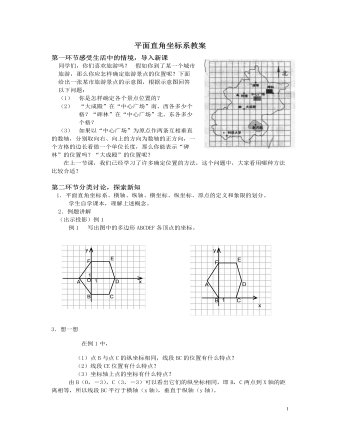
北师大初中数学八年级上册平面直角坐标系2教案
3.想一想在例1中,(1)点B与点C的纵坐标相同,线段BC的位置有什么特点?(2)线段CE位置有什么特点?(3)坐标轴上点的坐标有什么特点?由B(0,-3),C(3,-3)可以看出它们的纵坐标相同,即B,C两点到X轴的距离相等,所以线段BC平行于横轴(x轴),垂直于纵轴(y轴)。第三环节学有所用.补充:1.在下图中,确定A,B,C,D,E,F,G的坐标。(第1题) (第2题)2.如右图,求出A,B,C,D,E,F的坐标。第四环节感悟与收获1.认识并能画出平面直角坐标系。2.在给定的直角坐标系中,由点的位置写出它的坐标。3.能适当建立直角坐标系,写出直角坐标系中有关点的坐标。4.横(纵)坐标相同的点的直线平行于y轴,垂直于x轴;连接纵坐标相同的点的直线平行于x轴,垂直于y轴。5.坐标轴上点的纵坐标为0;纵坐标轴上点的坐标为0。6.各个象限内的点的坐标特征是:第一象限(+,+)第二象限(-,+),第三象限(-,-)第四象限(+,-)。
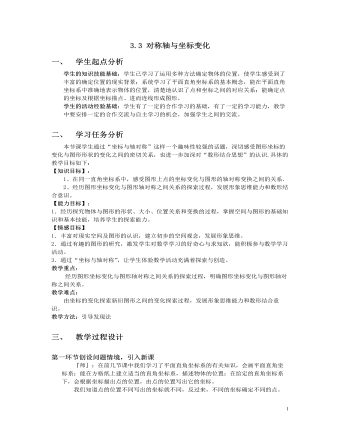
北师大初中数学八年级上册轴对称与坐标变化2教案
8.一束光线从点A(3,3)出发,经过y轴上点C反射后经过点B(1,0)则光线从A点到B点经过的路线长是( )A.4 B.5 C.6 D.7第四环节课堂小结1、关于y轴对称的两个图形上点的坐标特征:(x , y)——(- x , y)2、关于x轴对称的两个图形上点的坐标特征:(x , y)——(x , - y)3、关于原点对称的两个图形上点的坐标特征:(x , y)——(- x , -y)第五环节布置作业习题3.5 1,2,3四、 教学反思通过“坐标与轴对称”,经历图形坐标变化与图形的轴对称之间的关系的探索过程, 掌握空间与图形的基础知识和基本技能,丰富对现实空间及图形的认识,建立初步的空间观念,发展形象思维,激发学生对数学学习的好奇心与求知欲,学生能积极参与数学学习活动;积极交流合作,体验数学活动充满着探索与创造。教学中务必给学生创造自主学习与合作交流的机会,留给学生充足的动手机会和思考空间,教师不要急于下结论。事先一定要准备好坐标纸等,提高课堂效率。
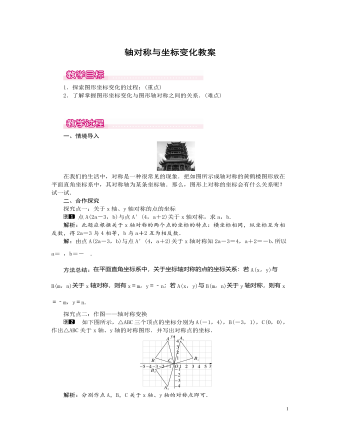
北师大初中数学八年级上册轴对称与坐标变化1教案
解析:从各点的位置可以发现A1(1,0),A2(1,1),A3(-1,1),A4(-1,-1),A5(2,-1),A6(2,2),A7(-2,2),A8(-2,-2),A9(3,-2),A10(3,3),A11(-3,3),A12(-3,-3),….仔细观察每四个点的横、纵坐标,发现存在着一定规律性.因为2015=503×4+3,所以点A2015在第二象限,纵坐标和横坐标互为相反数,所以A2015的坐标为(-504,504).故填(-504,504).方法总结:解决此类题常用的方法是通过对几种特殊情况的研究,归纳总结出一般规律,再根据一般规律探究特殊情况.三、板书设计轴对称与坐标变化关于坐标轴对称作图——轴对称变换通过本课时的学习,学生经历图形坐标变化与图形的轴对称之间的关系的探索过程,掌握空间与图形的基础知识和基本作图技能,丰富对现实空间及图形的认识,建立初步的空间观念,发展形象思维,激发数学学习的好奇心与求知欲.教学过程中学生能积极参与数学学习活动,积极交流合作,体验数学活动的乐趣.
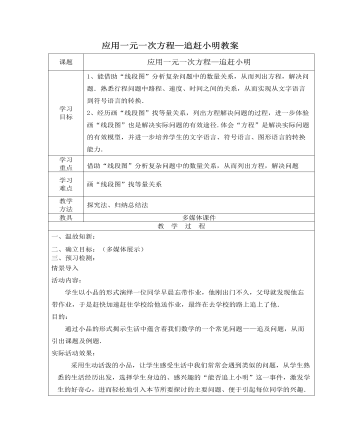
北师大初中七年级数学上册应用一元一次方程——追赶小明教案2
由于题目较简单,所以学生分析解答时很有信心,且正确率也比较高,同时也进一步体会到了借助“线段图”分析行程问题的优越性.六、归纳总结:活动内容:学生归纳总结本节课所学知识:1.会借线段图分析行程问题.2.各种行程问题中的规律及等量关系.同向追及问题:①同时不同地——甲路程+路程差=乙路程; 甲时间=乙时间.②同地不同时——甲时间+时间差=乙时间; 甲路程=乙路程.相向的相遇问题:甲路程+乙路程=总路程; 甲时间=乙时间.目的:强调本课的重点内容是要学会借线段图来分析行程问题,并能掌握各种行程问题中的规律及等量关系.引导学生自己对所学知识和思想方法进行归纳和总结,从而形成自己对数学知识的理解和解决问题的方法策略.
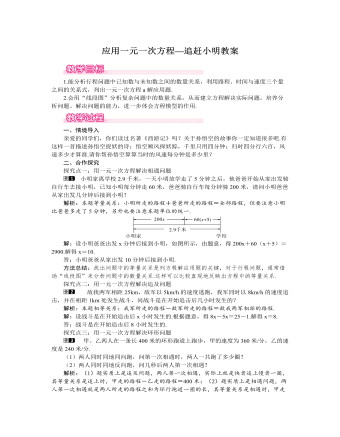
北师大初中七年级数学上册应用一元一次方程——追赶小明教案1
解:(1)设x分钟后两人第一次相遇,由题意,得360x-240x=400.解得x=103.(103×360+103×240)÷400=5(圈).答:两人一共跑了5圈.(2)设x分钟后两人第一次相遇,由题意,得360x+240x=400.解得x=23(分钟)=40(秒).答:40秒后两人第一次相遇.方法总结:环形问题中的相等关系:两个人同地背向而行:相遇问题(首次相遇),甲的行程+乙的行程=一圈周长;两个人同地同向而行:追及问题(首次追上),甲的行程-乙的行程=一圈周长.三、板书设计追赶小明→行程问题→相遇问题追及问题环形问题教学过程中,通过对开放性问题的探讨与交流,体验生活中数学的应用与价值,感受数学与人类生活的密切联系,激发学生学习数学的兴趣,培养学生的创新意识、团队精神和克服困难的勇气.
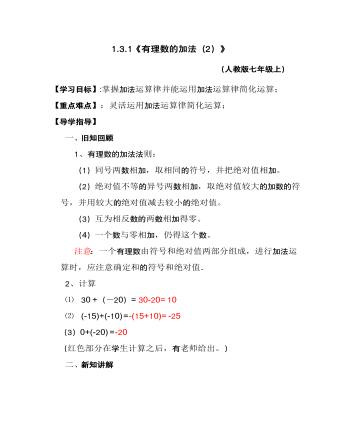
初中数学七年级上册第一章有理数加法第二课时
一、旧知回顾1、有理数的加法法则:(1)同号两数相加,取相同的符号,并把绝对值相加。(2)绝对值不等的异号两数相加,取绝对值较大的加数的符号,并用较大的绝对值减去较小的绝对值。(3)互为相反数的两数相加得零。(4)一个数与零相加,仍得这个数。注意:一个有理数由符号和绝对值两部分组成,进行加法运算时,应注意确定和的符号和绝对值.
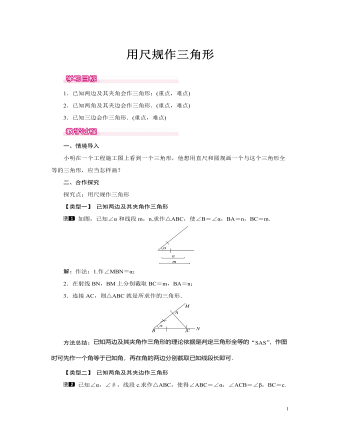
北师大初中七年级数学下册用尺规作三角形教案
【类型三】 已知三边作三角形已知三条线段a、b、c,用尺规作出△ABC,使BC=a,AC=b、AB=c.解:作法:1.作线段BC=a;2.以点C为圆心,以b为半径画弧,再以B为圆心,以c为半径画弧,两弧相交于点A;3.连接AC和AB,则△ABC即为所求作的三角形,如图所示.方法总结:已知三角形三边的长,根据全等三角形的判定“SSS”,知三角形的形状和大小也就确定了.作三角形相当于确定三角形三个顶点的位置.因此可先确定三角形的一条边(即两个顶点),再分别以这条边的两个端点为圆心,以已知线段长为半径画弧,两弧的交点即为另一个顶点.三、板书设计1.已知两边及其夹角作三角形2.已知两角及其夹边作三角形3.已知三边作三角形本节课学习了有关三角形的作图,主要包括两种基本作图:作一条线段等于已知线段,作一个角等于已知角.作图时,鼓励学生一边作图,一边用几何语言叙述作法,培养学生的动手能力、语言表达能力
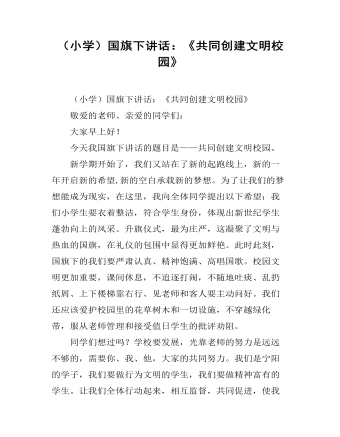
(小学)国旗下讲话:《共同创建文明校园》
今天我国旗下讲话的题目是——共同创建文明校园。新学期开始了,我们又站在了新的起跑线上,新的一年开启新的希望,新的空白承载新的梦想。为了让我们的梦想能成为现实,在这里,我向全体同学提出以下希望:我们小学生要衣着整洁,符合学生身份,体现出新世纪学生蓬勃向上的风采。升旗仪式,最为庄严,这凝聚了文明与热血的国旗,在礼仪的包围中显得更加鲜艳。此时此刻,国旗下的我们要严肃认真、精神饱满、高唱国歌。校园文明更加重要,课间休息,不追逐打闹,不随地吐痰、乱扔纸屑、上下楼梯靠右行、见老师和客人要主动问好。我们还应该爱护校园里的花草树木和一切设施,不穿越绿化带,服从老师管理和接受值日学生的批评劝阻。
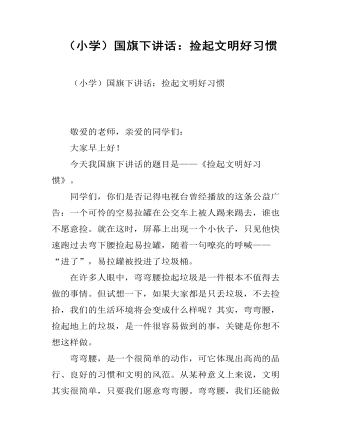
(小学)国旗下讲话:捡起文明好习惯
同学们,你们是否记得电视台曾经播放的这条公益广告:一个可怜的空易拉罐在公交车上被人踢来踢去,谁也不愿意捡。就在这时,屏幕上出现一个小伙子,只见他快速跑过去弯下腰捡起易拉罐,随着一句嘹亮的呼喊——“进了”,易拉罐被投进了垃圾桶。在许多人眼中,弯弯腰捡起垃圾是一件根本不值得去做的事情。但试想一下,如果大家都是只丢垃圾,不去捡拾,我们的生活环境将会变成什么样呢?其实,弯弯腰,捡起地上的垃圾,是一件很容易做到的事,关键是你想不想这样做。弯弯腰,是一个很简单的动作,可它体现出高尚的品行、良好的习惯和文明的风范。从某种意义上来说,文明其实很简单,只要我们愿意弯弯腰。弯弯腰,我们还能做许多事:弯弯腰,随手捡起同学掉下的铅笔;弯弯腰,鞠躬向老师问声好;弯弯腰,扶起摔倒的小同学
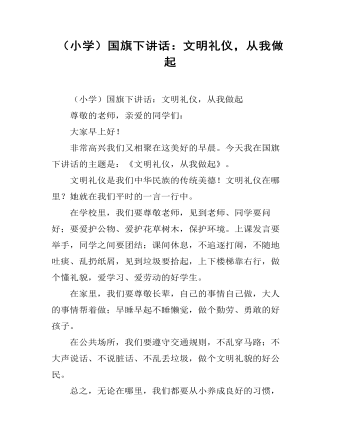
(小学)国旗下讲话:文明礼仪,从我做起
尊敬的老师,亲爱的同学们: 大家早上好!非常高兴我们又相聚在这美好的早晨。今天我在国旗下讲话的主题是:《文明礼仪,从我做起》。文明礼仪是我们中华民族的传统美德!文明礼仪在哪里?她就在我们平时的一言一行中。在学校里,我们要尊敬老师,见到老师、同学要问好;要爱护公物、爱护花草树木,保护环境。
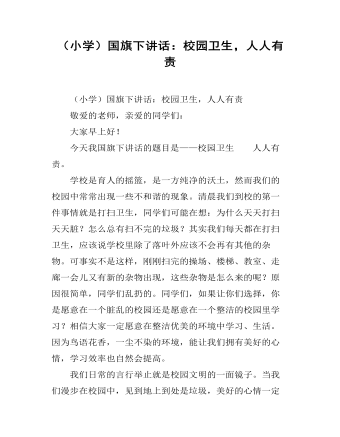
(小学)国旗下讲话:校园卫生,人人有责
今天我国旗下讲话的题目是——校园卫生 人人有责。学校是育人的摇篮,是一方纯净的沃土,然而我们的校园中常常出现一些不和谐的现象。清晨我们到校的第一件事情就是打扫卫生,同学们可能在想:为什么天天打扫天天脏?怎么总有扫不完的垃圾?其实我们每天都在打扫卫生,应该说学校里除了落叶外应该不会再有其他的杂物。可事实不是这样,刚刚扫完的操场、楼梯、教室、走廊一会儿又有新的杂物出现,这些杂物是怎么来的呢?原因很简单,同学们乱扔的。同学们,如果让你们选择,你是愿意在一个脏乱的校园还是愿意在一个整洁的校园里学习?相信大家一定愿意在整洁优美的环境中学习、生活。因为鸟语花香,一尘不染的环境,能让我们拥有美好的心情,学习效率也自然会提高。

